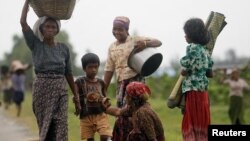BANGKOK — Burma's human rights commission says there is no need for an investigation into the communal violence between Buddhists and Muslim Rohingya that broke out in June.
The refusal comes as the Organization of Islamic Cooperation says it will take up the Burmese government’s handling of the unrest with the U.N. Security Council.
When the United Nations special rapporteur to Burma visited areas affected by the violence in Rakhine state last month, he called on Burma's National Human Rights Commission to form a truth commission for a comprehensive and transparent investigation.
The chairman of the commission, Win Mra, said Thursday he was puzzled by the suggestion, and denied that his group was responsible for completing such an investigation. He says a separate group of government investigators are only looking into the killings that led to the outbreak of violence.
"I don't know why he would do that, he said. "In fact, what I know is that the government has already formed a high-level investigation group to inquire into the two cases that it is the rape and the murder of ten people."
Win Mra also said that the observations of U.N. Human Rights Special Envoy Tomas Ojea Quintana were biased. He did not elaborate in an interview with VOA.
The National Human Rights Commission sent a three-person delegation in July to investigate what Win Mra described as the humanitarian needs of the people affected by the conflict, but has not addressed the accusations that the military gave preferential treatment to a particular ethnic group, an accusation he called "extreme."
Win Mra also stressed that the situation was still incredibly delicate, and that he hoped it would not stand in the way of Burma's road to democracy.
Meanwhile, the Organization for Islamic Cooperation this week expressed concern for the Rohingya people in Burma and said it will take up the Burmese government’s handling of unrest with the U.N. Security Council.
Jim Della-Giacoma, an analyst for International Crisis Group, says alienating Muslim nations could be problematic for Burma's future as a member state of the Association of Southeast Asian Nations. The root of the problem lies in the government's failure to recognize the Rohingya as citizens, he said.
"Bring the Rohingya and all the minorities to a modern Myanmar, that recognizes that minorities exist, that it's a multi-ethnic country, has many religions, and that the rights of all these minorities need to be protected by the modern state and not discriminated against," Della-Giacoma said.
The United Nations released a report Thursday saying the number of people displaced by the conflict in Rakhine state has exceeded 68,500, and is still rising, with new arrivals from Kyauktaw, Sittwe, and Maungdaw, where sporadic incidents of violence are still occurring.
The refusal comes as the Organization of Islamic Cooperation says it will take up the Burmese government’s handling of the unrest with the U.N. Security Council.
When the United Nations special rapporteur to Burma visited areas affected by the violence in Rakhine state last month, he called on Burma's National Human Rights Commission to form a truth commission for a comprehensive and transparent investigation.
The chairman of the commission, Win Mra, said Thursday he was puzzled by the suggestion, and denied that his group was responsible for completing such an investigation. He says a separate group of government investigators are only looking into the killings that led to the outbreak of violence.
"I don't know why he would do that, he said. "In fact, what I know is that the government has already formed a high-level investigation group to inquire into the two cases that it is the rape and the murder of ten people."
Win Mra also said that the observations of U.N. Human Rights Special Envoy Tomas Ojea Quintana were biased. He did not elaborate in an interview with VOA.
The National Human Rights Commission sent a three-person delegation in July to investigate what Win Mra described as the humanitarian needs of the people affected by the conflict, but has not addressed the accusations that the military gave preferential treatment to a particular ethnic group, an accusation he called "extreme."
Win Mra also stressed that the situation was still incredibly delicate, and that he hoped it would not stand in the way of Burma's road to democracy.
Meanwhile, the Organization for Islamic Cooperation this week expressed concern for the Rohingya people in Burma and said it will take up the Burmese government’s handling of unrest with the U.N. Security Council.
Jim Della-Giacoma, an analyst for International Crisis Group, says alienating Muslim nations could be problematic for Burma's future as a member state of the Association of Southeast Asian Nations. The root of the problem lies in the government's failure to recognize the Rohingya as citizens, he said.
"Bring the Rohingya and all the minorities to a modern Myanmar, that recognizes that minorities exist, that it's a multi-ethnic country, has many religions, and that the rights of all these minorities need to be protected by the modern state and not discriminated against," Della-Giacoma said.
The United Nations released a report Thursday saying the number of people displaced by the conflict in Rakhine state has exceeded 68,500, and is still rising, with new arrivals from Kyauktaw, Sittwe, and Maungdaw, where sporadic incidents of violence are still occurring.











